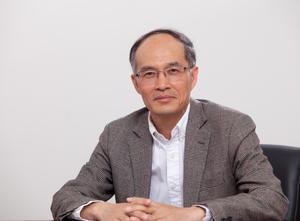Four experts share their ideas on innovation and technology trends that will shape the future
 Wang Feiyue is director of the State Key Laboratory for Management and Control of Complex Systems at the Chinese Academy of Sciences' Institute of Automation. His current research focuses on methods and applications for parallel intelligence, social computing and knowledge automation. In 2007, he received China's National Prize in Natural Sciences. (PHOTO PROVIDED TO CHINA DAILY)
Wang Feiyue is director of the State Key Laboratory for Management and Control of Complex Systems at the Chinese Academy of Sciences' Institute of Automation. His current research focuses on methods and applications for parallel intelligence, social computing and knowledge automation. In 2007, he received China's National Prize in Natural Sciences. (PHOTO PROVIDED TO CHINA DAILY)
Foundations in place for globalization
By Ouyang Shijia
The rise of artificial intelligence is revolutionizing and reshaping the world, opening a new era of new information technology and intelligent technology, artificial intelligence expert Wang Feiyue said at the latest Vision China event on Tuesday.
Wang, director of the Chinese Academy of Sciences' State Key Laboratory for Management and Control of Complex Systems, said the victory of computer program Alpha-Go over one of the world's best Go players in 2016 was a watershed.
"AlphaGo made a great contribution to the popularity of AI in China," Wang said.
"Since Go can be solved in this way, any intelligence problem involving a specific application can be solved in the same way. Therefore, in the future, all intelligent algorithms will be calculated in this way-a paradigm shift from computing to intelligence."
Wang cited Austrian-born philosopher Karl Popper's notion that there are three worlds-the physical, psychological and the artificial. "I believe that a new globalization is coming, (and) this new Intelligent era is coming. That is why I think AI is important. I think it's just the beginning," he said.
Wang said five networks must be established for the new era: the internet of transportation; the internet of energy; the internet of information; the internet of things; and the internet of minds. "The five networks connect the three worlds into a whole," he said.
Wang said people can use the internet of energy to get energy from the physical world and the internet of things to get knowledge and intelligence from the artificial world. In this way, the five forces can be integrated.
"Artificial intelligence has built a solid foundation for an intelligent system. Otherwise, relying on big data alone is like building on a foundation of sand, which is dangerous and impossible," he said.
Wang said while AI is intended to reduce the use of manpower, it will result in more employment.
With the growth of big data, cloud computing and other cutting-edge technologies, AI is gradually becoming a key driving force of economic growth.
According to a report released by Xinhua News Agency and CCID Consulting, China's AI industry is expected to be worth more than 100 billion yuan (US$14 billion) by 2022.
Sun Huifeng, president of CCID Consulting, said AI is playing a key role in promoting high-quality development.
"With the future development of AI technologies, intelligent applications like intelligent driving and smart robots will gradually improve over time," Sun said.
ouyangshijia@chinadaily.com.cn
 Ehud Levy is managing partner at Canaan Partners Israel and venture partner at Lenovo Capital. Levy has more than two decades of experience in high-tech industry as an entrepreneur, investor and operator. Before that, Levy was managing partner at Vertex VC for seven years. He led the first investment round in the navigation app Waze and served on its board of directors until its acquisition by Google for over US$1 billion. (PHOTO PROVIDED TO CHINA DAILY)
Ehud Levy is managing partner at Canaan Partners Israel and venture partner at Lenovo Capital. Levy has more than two decades of experience in high-tech industry as an entrepreneur, investor and operator. Before that, Levy was managing partner at Vertex VC for seven years. He led the first investment round in the navigation app Waze and served on its board of directors until its acquisition by Google for over US$1 billion. (PHOTO PROVIDED TO CHINA DAILY)
AI is a 'revolution' for everyone
By Cheng Yu
Artificial intelligence is being widely adopted and is playing an increasingly important role in various sectors, according to an industry insider. "AI is one of the revolutions that we all live in. It's the first time in our 4.5-billion-year history that a nonorganic thinking creature was created," Ehud Levy, managing partner at Canaan Partners Israel and venture partner at Lenovo Capital, said at the Vision China event on Tuesday.
In 2018, only 3 percent of large companies used AI. But this year, the total is expected to reach 25 percent, he said.
"The tremendous growth is mainly thanks to the development of sophisticated algorithms, the access to an enormous amount of data, the ability to store it in the cloud and to access it, as well as the availability of very powerful computational systems at very affordable costs," he said.
As a veteran investor, Levy pointed out that AI companies tend to have much higher valuations than other companies. "We also see that in our deal flow, about 90 percent are AI related," he said.
Levy said in recent years AI has been adopted by a wide number of sectors and penetrated everyone's lives.
During the COVID-19 outbreak AI played an active role in helping the world contain the epidemic.
He said one of the portfolio companies at Lenovo Capital has developed a delivery robot that has been put into use to help minimize contact between patients and medical staff.
Public health authorities have used AI to predict the spread of the disease.
They also use AI to develop vaccines and model molecular structures that could result in effective drugs to treat the coronavirus, he added.
"AI is helping deal with unprecedented situations, situations where human experience cannot help," Levy said.
However, he noted that though AI has a lot of potential, it comes with many challenges. AI training involves human input, which in many cases can be imperfect, Levy said.
"There are specific AI applications where in the real world, like job screening, insurance approval and loan approval by banks, they tend to reproduce social biases. Typically, these are related to gender and race," he said.
Another risk is putting people out of work. "Advanced AI applications, such as language processing, could replace call centers and customer care services," he said.
 Jose Pedro Magalhaes Lucas is in charge of the Luban Portuguese Workshop at the Polytechnic Institute of Setubal in Portugal. He mainly teaches automation and distributed automation and control systems that have industrial applications. He has been the coordinator of the Polytechnic Institute of Setubal's major in automation, robotics and industrial control since 2015. He was in charge of the institute's automation and robotics laboratory from 1997 to 2017. (PHOTO PROVIDED TO CHINA DAILY)
Jose Pedro Magalhaes Lucas is in charge of the Luban Portuguese Workshop at the Polytechnic Institute of Setubal in Portugal. He mainly teaches automation and distributed automation and control systems that have industrial applications. He has been the coordinator of the Polytechnic Institute of Setubal's major in automation, robotics and industrial control since 2015. He was in charge of the institute's automation and robotics laboratory from 1997 to 2017. (PHOTO PROVIDED TO CHINA DAILY)
Tech training courses unite China and Portugal
By Zheng Yiran
At the Luban Portuguese Workshop in Setubal, Portugal, 16 high-tech machines are running at full speed. Inside the workshop are college students learning automation, while visiting teachers and students observe the lessons.
One of the visiting students remarks loudly, "Chinese technology and Chinese equipment are astonishing!"
Jose Pedro Magalhaes Lucas, dean of the Luban Portuguese Workshop, said the training equipment is more advanced than what the institute had before.
The Luban Portuguese Workshop was established by the Tianjin Vocational College of Mechanics and Electricity and the Polytechnic Institute of Setubal in Portugal. On Dec 5, 2018, the mayor of Tianjin and the mayor of Setubal signed the Portuguese Luban Workshop Construction Agreement to mark the 40th anniversary of China-Portugal diplomatic ties.
At the heart of the project is technical training to develop skilled professionals familiar with Chinese technology, products and standards.
The workshop was named after China's great craftsman and inventor Lu Ban, who lived during the Spring and Autumn Period (770-476 BC).
He was famous for creating numerous carpentry tools and was revered as China's master craftsman.
"The Luban Workshop is a major achievement of Tianjin's international exchanges and cooperation in vocational education. It is a wide and very complete Industry 4.0 engineering infrastructure, with full potential for collaboration with industry," said Lucas, referring to the new phase of industrial development that focuses on interconnectivity, automation, machine learning and real-time data.
The workshop is a stimulating space for teaching, and is fitted out well enough for students to practice their skills for academic competitions, he added.
To date, the workshop has trained 44 college students and 18 postgraduates majoring in automation. Ten undergraduates have completed studies in the application of programmable automation projects.
The workshop has also provided special training sessions on industrial robot technology for both teachers and students.
Lyu Jingquan, deputy director of the management committee of Tianjin Haihe Education Park, said Portuguese students have solid basic knowledge, but there is a gap in operational skills between them and their Chinese counterparts.
"The programs taught in the Luban Portuguese Workshop are guided by practical applications and cultivate students' scientific inquiry ability and problem solving ability, which can greatly reduce the running-in period of graduates entering enterprises," Lyu told Xinhua News Agency.
"The teaching mode is in line with the needs of modern enterprises."
Chen Jiquan is chairman of Yalong Intelligent Equipment Group, which gave some of the training equipment to the workshop. "The workshop builds a bridge that connects Chinese enterprises with the world and promotes Chinese technology abroad," Chen said.
He said that it also helps Chinese enterprises based abroad to cultivate local employees who are familiar with Chinese technology, products and craftsmanship.
Lucas offered his gratitude to China, Tianjin and Tianjin Vocational College for the friendliness and support shown to his institute. "Thank you China, Thank you Tianjin, Thank you Tianjin Vocational College for all your friendliness and support to let us, at IPS Portugal, to dream with new era of a world with a strong digital intelligence.," he said at the Vision China event on Tuesday.
 Paul Schulte is the founder of Schulte Research, established in 2012 to conduct research on banks, financial technology, and bank and credit algorithms. His career in equity research spans 27 years and covers Asian and emerging markets. He has worked for all three branches of the US government, including the National Security Council. Schulte currently teaches at three universities and has written five books and authored hundreds of articles. (PHOTO PROVIDED TO CHINA DAILY)
Paul Schulte is the founder of Schulte Research, established in 2012 to conduct research on banks, financial technology, and bank and credit algorithms. His career in equity research spans 27 years and covers Asian and emerging markets. He has worked for all three branches of the US government, including the National Security Council. Schulte currently teaches at three universities and has written five books and authored hundreds of articles. (PHOTO PROVIDED TO CHINA DAILY)
Rapid 5G rollout securing the future
By Ma Si
China has taken a lead in many areas of financial technologies, such as mobile payments and e-commerce, Paul Schulte, head of an institute that focuses on research of financial institutions and technology, told the Vision China event on Tuesday.
When it comes to e-commerce and mobile payments, Chinese internet companies Alibaba and Tencent have expanded their presence from Beijing to Singapore, Jakarta and the Middle East, said the founder of Schulte Research.
He said one of the reasons for the popularity of digital payments in China is that the country doesn't have large credit card companies trying to maintain market share. As a result, China was able to create a new type of payment infrastructure from scratch, Schulte said.
In addition to China's active role in financial technologies, the country is also moving ahead in autonomous cars, battery technology and 5G, where China is substantially ahead of the rest of the world, Schulte said. "China's move into 5G is very much geared toward an industrial build to address industrial issues like smart cities, urban planning and the integration of the healthcare systems," Schulte said.
China is expediting the construction of its faster 5G networks. More than 10,000 new 5G base stations are being built in China every week. The rapid rollout came after more than 200,000 5G base stations became operational nationwide from mid-May, according to the Ministry of Industry and Information Technology.
By the end of this year, 5G services are expected to be available in about 350 cities across China.
The nation's telecom carriers will invest 180 billion yuan (US$25.4 billion) in the 5G rollout this year, which will motivate telecom companies to invest more than 520 billion yuan in superfast wireless technology, a think tank affiliated with the Ministry of Industry and Information Technology forecast.
"5G is perfect for two things: extremely large amounts of data and very cheap individual transactions," Schulte said.
"That's what 5G is really implemented for. It makes the greatest amount of sense in the area of industrial use where 5G can monetize itself."
Schulte said 5G needs to be in use worldwide so that the superfast wireless technology can benefit people around the globe.


